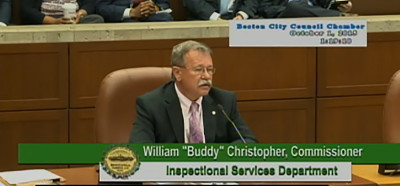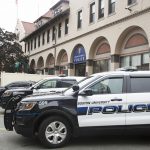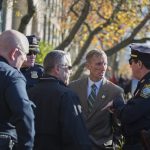 In an effort to make student housing safer, Boston City Council met Thursday to consider revising the “No More Than Four” zoning amendment that prohibits more than four undergraduate students from living in one apartment.
In an effort to make student housing safer, Boston City Council met Thursday to consider revising the “No More Than Four” zoning amendment that prohibits more than four undergraduate students from living in one apartment.
This amendment helps create healthier and safer housing conditions for college students in the city, but it cannot be enforced, said Inspectional Services Department Commissioner William Christopher.
“When [the amendment] was first written by the councilors, we had a lot of communication with students, but it’s turned into something that landlords have been using to be a little bit more divisive,” he said. “They’re telling students not to let ISD into the building. We cannot help students, which is our primary goal, unless they let us know about these problems.”
Councilors Josh Zakim, who represents student areas including Kenmore and Mission Hill, and Mark Ciommo, who represents Allston and Brighton, co-sponsored the legislation.
A potential solution to this problem would be to transfer the ordinance into the sanitary code, Christopher said, which would penalize landlords and help the ISD better understand some housing issues.
“In the sanitary code, it talks about the square footage of occupants and it talks about smoke detectors, heating, [and] carbon monoxide,” he said. “These are the things that promulgate safe and clean housing for our students.
Following the death of Boston University student Binland Lee, whose Allston apartment she shared with 13 others caught fire in 2013, overcrowded student housing has become more of an issue to city officials.
Christopher said in the past year, of the 25,000 off-campus addresses that colleges and universities provided, the ISD visited 600 buildings with possible housing violations. Less than 10 percent of tenants opened their doors for investigation, and ISD found zero cases of violation, he said.
Councilor-at-Large Michelle Wu addressed the need to attend to students and long-term residents with equal attention.
“As much as we all may think a little bit otherwise when we get the calls of loud parties at night, our focus is really making sure that everybody has a roof over their heads, enough space and a clean habitable environment,” she said. “And I’m here to support that work.”
Residents who testified said universities should play a major role in improving the housing situation.
Carol Ridge-Martinez, executive director of the Allston-Brighton Community Development Corporation, said the influx of students to apartments is pushing families out.
“The traditional one, two, three family houses were affordable to families and were what keep them here,” she said in her testimony. “As students go into those units, it’s hard to convince a family to come and live in because of the effect of student housing market.”
Martinez also said that universities should have done a better job informing students and their parents on the overcrowding problem.
Bruce Kline, who graduated from BU in 1965, said the university should provide more affordable dorms to reduce the number of students who move off-campus.
“Our neighborhood is becoming a dormitory … we want to maintain the traditional working class neighborhood,” he said. “[The amendment] cuts down overcrowding issues. These houses are designed for seven or eight people, but they are putting in double of that number.”
Several residents who did not attend the hearing said they understand the concern about the condition of student housing, but they are not sure about the amendment.
Jan Pothier, 40, of Allston, said one problem that the amendment brings is a lack of availability.
“The amendment is fair, however, we will not have enough apartments if we have only four students per apartment,” she said.
Rajinder Gill, 44, of Beacon Hill, said that unsafe living conditions should be closely monitored.
“I know cases where three guys and two girls [were] living in one apartment, all sharing one bathroom,” he said. “Their landlord should have followed the regulation instead of waiting for the government to intervene.”














